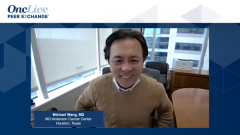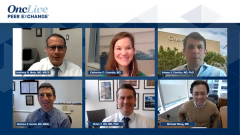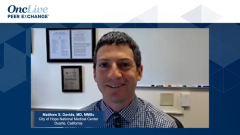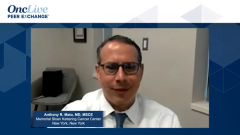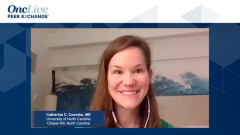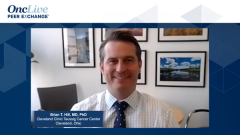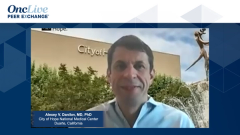
Strategies for Sequencing and Combining Therapies in MCL
A panel of distinguished faculty builds a lively conversation on the emergence of pirtobrutinib and its effect on treatment sequencing strategies in MCL as well as the overall role of doublet and triplet regimens.
Episodes in this series

Anthony R. Mato, MD, MSCE: Michael, since we're on the topic of mantle cell lymphoma (MCL), we want to switch gears now to emerging therapies. I want to start with pirtobrutinib because you've done a lot here in this space, particularly in MCL. You presented data at that most recent ASH (American Society of Hematology) [Annual] Meeting [& Exposition] that were very compelling, so help us to understand the data for pirtobrutinib post-BTK (Bruton tyrosine kinase) inhibitor. In a world where we now have CAR (chimeric antigen receptor) [T-cell therapy], we have pirtobrutinib. We have several approved covalent inhibitors. How this is going to fit into management, assuming this drug were approved someday?
Michael Wang, MD: In my opinion, I have been working with ibrutinib and acalabrutinib and all that. I thought those were the best oral drugs, and [they] do not cause too much cytopenia. New infusions, new chemotherapy, new hospital stays. But I never knew that we could have an even better-tolerated drug like pirtobrutinib. Of course, we have to be careful in making this less toxic because we not have treated enough patients. We have not given them a longer follow-up time. Pirtobrutinib, so far, is much less toxic compared with the early days of my experience with ibrutinib and acalabrutinib, both of which I led the approvals for. Pirtobrutinib, in my opinion, is very, very well tolerated.
The most attractive part is the efficacy, like Anthony pointed out. Although it inhibits the same target, even after the failure of the BTK inhibitors, pirtobrutinib can still induce a response of over 50%. Of course, there's cross-resistance because, if we have a cohort of patients who have never received it, with BTK inhibitors, the response rate is 70%. I really think pirtobrutinib is a [good] drug for MCL, and you can speak on its part in CLL (chronic lymphocytic leukemia), and I am looking forward [to] its approval so that it can come to the patients as early as possible. We can use it in the prior relapse setting. We are studying in the first-line setting. We can use it before CAR [T-cell therapy], in combination with the CAR[T-cell therapy], and even maintenance after CAR [T-cell therapy]. Pirtobrutinib, in my opinion, is a very exciting and promising drug.
Anthony R. Mato, MD, MSCE: Matt, I want to talk to you about doublets and triplets because, in CLL, I think there's a general consensus that more is always better. It may not always be true, but there are data for AVO (acalabrutinib/venetoclax/obinutuzumab), ZVO (zanubrutinib/venetoclax/obinutuzumab), I+V (ibrutinib/venetoclax). I'm sure there's a triplet out there somewhere that I don't know about in MCL in the frontline setting giving all the best agents together. Do you want to comment on that strategy? Alexey, Michael or Brian, anybody want to weigh in? Do you think that triplets have a future in frontline MCL?
Matthew S. Davids, MD, MMSc: [I’d be] happy to comment on that. We haven't really talked much about venetoclax yet, but venetoclax, even as a single agent, is active in MCL, but the responses are not that durable. There has been a lot of interest in combination approaches, like we've done in CLL, going back to the I+V doublet data from the Melbourne group, published in New England Journal [of Medicine] a few years ago. More recently, it has been triplet-based strategies in MCL that have been pursued. The French group published the IVO (ibrutinib/venetoclax/obinutuzumab) data in Blood last year, which looks promising, and now there [are] studies underway with the next generation of BTK inhibitors in triplet regimens. We actually have a study at Dana Farber [Cancer Institute] with acalabrutinib/venetoclax/obinutuzumab for MCL, and then the group from Memorial Sloan Kettering [Cancer Center] and MGH (Massachusetts’s General Hospital) presented some early data at the ASH [Annual] Meeting [& Exhibition] on the ZVO regimen. This was for patients with high-risk MCL. [It’s a] very early dataset, but I think it shows you how enthusiastic people are because the up track was accepted with 12 patients. The tolerability was very good, the responses look good so far, although it's early. Especially with these better-tolerated BTK inhibitors, I think triplet therapies will be feasible. I think the question is, which population will benefit most? Is it only the patient [with] high-risk [disease]? Should we be pursuing this in patients [with] MCL who may be not great chemotherapy candidates? Is the triplet really needed, or is a doublet going to be sufficient? [There are] still a lot of unanswered questions.
Anthony R. Mato, MD, MSCE: Michael, to follow up, [I’m] trying to understand the rationale for doublets and triplets when we don't even have any targeted therapies approved [in the] frontline [setting]. Can you speak to that?
Michael Wang, MD: I think the future belong to triplets in the frontline setting. I think doublets [are] not powerful enough to compare with the intense therapy. If we want to replace intensive therapy, we have to use a triplet. And [we want it to have] a very good period of time of maintenance. As I indicated, we're going to do a study [with] 50 patients enrolled [to investigate] ibrutinib/rituximab/venetoclax. After a 3-year follow-up so far, we [don’t] even have a single relapse. With pirtobrutinib and others coming, I really think the future looks like it's going to be triplets. With a wind up of the clocks, we can get good response with maintenance, and if they relapse, then [use] CAR-T Cell therapy. I think that's the future.
Transcript has been edited for clarity.


